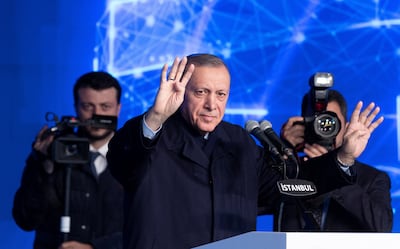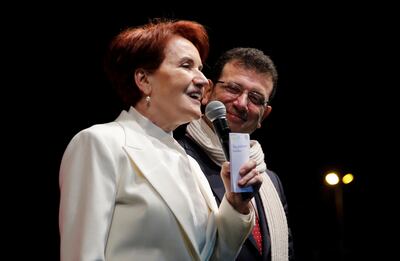The talk in Turkey in recent days is all about the conviction of a top opposition politician.
Given all the reports in recent years of the Turkish government taking greater control of the judiciary, it’s not much of a leap to assume that President Recep Tayyip Erdogan’s governing AKP was in favour of last week’s judicial decision to sentence Istanbul Mayor Ekrem Imamoglu to two and a half years in prison for insulting electoral officials.
Several Turkish law professors have made clear that Mr Imamoglu’s offence – calling the officials “idiots” after his 2019 electoral victory – fell short of the legal requirements for the crime of defamation. Former president and former Erdogan ally Abdullah Gul called the decision an “injustice", Mr Imamoglu described it as “proof that there is no justice", and the US State Department said it was “inconsistent with respect for human rights, fundamental freedoms, and the rule of law".
So why might the AKP take such a risk? The most obvious objective would be to keep the most charismatic opposition candidate from running for president next June (the conviction, if upheld by a higher court, comes with a political ban). But this line of thinking is flawed.
First, as I recently detailed, Mr Imamoglu’s main opposition CHP has been leaning towards naming Kemal Kilicdaroglu as its presidential candidate, despite other figures outpolling the party’s 73-year-old leader. Second, Mr Imamoglu himself said back in May that running for president was not on his agenda. Finally, Mr Imamoglu is sure to appeal, and given the huge case backlog, a follow-up decision could take a year or more, which would enable Mr Imamoglu to remain mayor and run for president.
Perhaps the decision was a broader attempt to erode opposition support? Amid a years-long economic crisis and rampant inflation, countless Turks have fallen into desperate financial straits and polls mostly reflect waning support for the governing party. Cutting down the opposition’s brightest star, who defeated the AKP twice in 2019, would send the message that anti-government figures are unreliable, even criminal.

Yet, within hours of the decision, people took to the streets to voice their dissent. The next day, tens of thousands rallied in central Istanbul, perhaps the largest opposition rally in years, as the alliance denounced the decision and vowed to fight on. None of this could have come as a surprise for the AKP – a party born from the ashes of Mr Erdogan’s 1990s stint as Istanbul mayor, which ended when he too was banned from politics and sentenced to prison.
He emerged from jail a hero, co-founded the AKP and won the next election as voters expressed dissatisfaction with rampant corruption and economic trouble. The length of Mr Imamoglu’s sentence seems telling. In Turkey, sentences of less than three years rarely result in prison time, so Mr Imamoglu is unlikely to go to jail even if he loses his appeal. This means the opposition will be denied the images of suffering that might catapult Mr Imamoglu to power.
Taken together, it’s unlikely that the AKP brass expected opposition supporters to simply accept their fate and turn away from the CHP. More likely is that they knew banning Mr Imamoglu would, at least in the short term, energise their foes. “This is not about Ekrem Imamoglu,” an angry minimum wage worker in Istanbul told the Turkey Recap newsletter. “This is about Turkey, this is about democracy.”
So if the objective was neither to knock Mr Imamoglu from the race nor deliver a decisive blow to the opposition, what might it have been? It could simply be that the governing party sought to silence critics. Again, the anger and frustration visible on the streets of Istanbul in the days after the verdict would seem to prove this line of thinking wrong as well.
Also, a glance across the border to Iran would presumably have disabused the AKP of the belief that a single harsh punishment would silence burbling national dissent. What’s more, this campaign is sure to be a marathon, not a sprint, and this verdict could have been merely the first shot across the bow.
Yet, my view is that the Imamoglu verdict is not part of any vision, but a sign of desperation. On the weekend, the president acknowledged the possibility that it may have been an error, asserting that the courts would correct any mistake in the appeal process.
It could simply be that after two decades in power, the AKP sees the writing on the wall. They have endeavoured to boost the economy, to little avail. They vowed to send 2 million Syrian refugees back home, and have not done so. They hoped to rally nationalist sentiment with another Syria incursion, but Russia and the US have stood in their way.

Now, like an ageing heavyweight champion, bloodied and stumbling around the ring in the late rounds, the AKP has taken a wild swing and landed a major blow. Yet, it might prove its undoing. There will surely be more twists and turns before Turkey’s June presidential and parliamentary vote, but this verdict suggests a no-holds-barred campaign strategy.
The irony is that, rather than making Mr Imamoglu unfit to run, this conviction could propel him into the candidacy. After several stumbles that probably eroded his support, the mayor suddenly looks like a victim and survivor.
The decision has rallied his under-30 base, which now has a rock-solid narrative – “His March 2019 victory was taken away, yet he roared back. Now he’s suffered another political injustice … ” – to super-charge the social media debate in the months ahead.
Opposition partner Meral Aksener, head of the nationalist IYI Party, had already expressed doubts about Mr Kilicdaroglu as the candidate. Since the verdict, she has hinted at backing Mr Imamoglu, making a sly reference to Mr Erdogan’s post-conviction rise to power. Put it all together and the figure facing a ban and jail time could be the likeliest opposition candidate.
Of course, burasi Turkiye ("this is Turkey"), so there's always the possibility that the appeal process will be expedited and Mr Imamoglu will be barred from running just as the campaign enters the stretch run, leaving the opposition scrambling to field a serious candidate.
But such are the risks for an opposition seeking to end a two-decade reign.









